South Africa – Let’s explore here
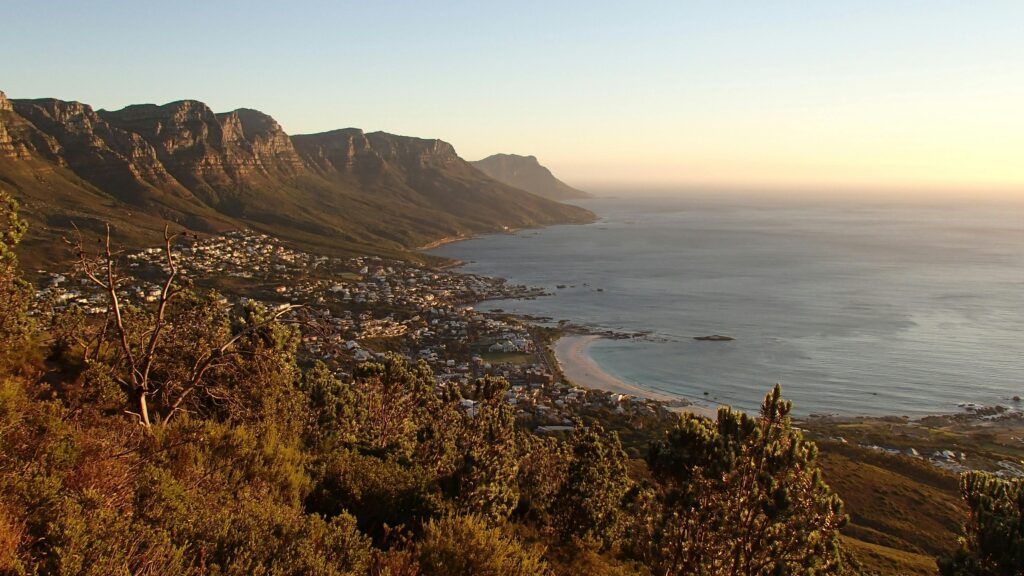
What’s it like in South Africa?
South Africa is a stunningly beautiful country, located at the southernmost tip of Africa. Its name in its other official languages is iRiphabhuliki yaseNingizimu Afrika / iRiphabhlikhi yoMzantsi Afrika / Republiek van Suid-Afrika.
It’s about four times the size of Italy, and most of the terrain is fairly flat, but at an altitude of between 3,300 – 6,900 ft (1,000 – 2,100 m) above sea level. The plateau falls steeply towards the coasts, forming the Great Escarpment. The highest point is Mount Mafadi, at 11,306 ft (3,446 m) above sea level.
It has the greatest number of world heritage sites in Africa. The ‘Cradle of Humankind’ sits in the north east of the country – a site that has produced an enormous number of hominin fossils, some of the oldest ever found, dating as far back as 3.5 million years ago.
It has a very long, rich and troubled history, including slavery and enforced racial segregation. Despite this, the country has never experienced a coup d’état, and is now held up as a paragon of multicultural diversity. It shares its land borders with Botswana, Eswatini, Lesotho, Mozambique, Namibia and Zimbabwe. Lesotho is landlocked by South Africa.
The population is around 62 million people (2022), with about 3 million living in the capital, Pretoria. It also operates a digital nomad visa scheme, which you may find of interest.
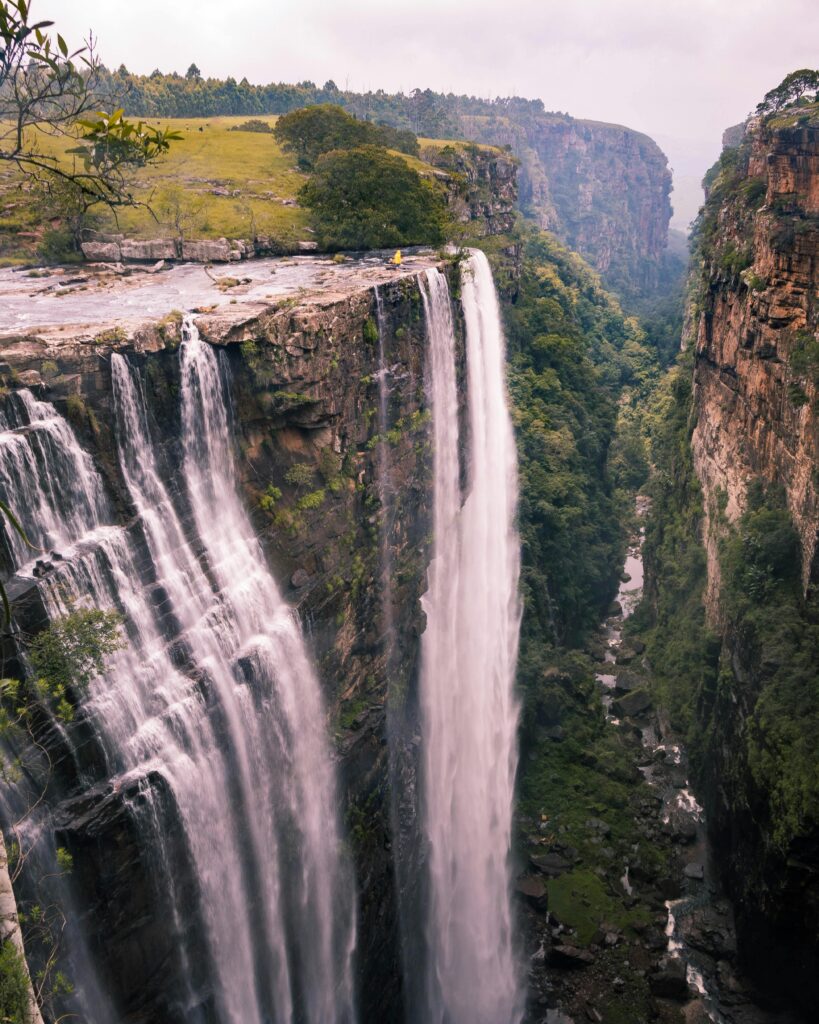
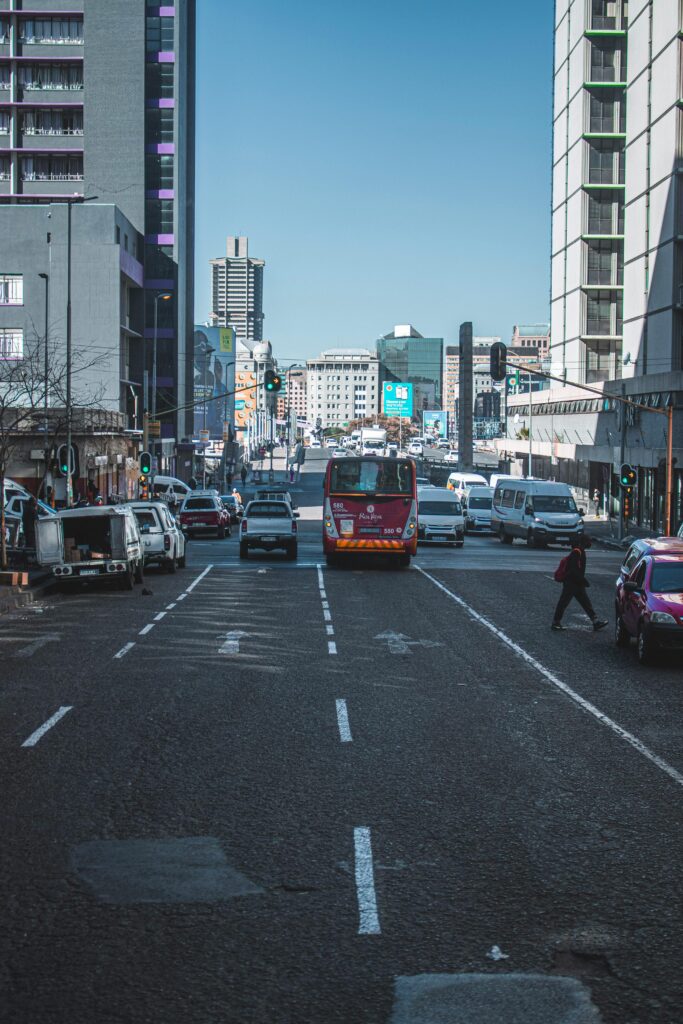
A bit about the history of South Africa
Pre-Colonial Era
Before European arrival, South Africa was inhabited by various indigenous groups, including the Khoisan, Zulu, Xhosa and Sotho-Tswana. These groups had well established cultures, trading systems and political structures. The region was also part of broader trade networks across Africa, the Indian Ocean, and beyond.
Colonial Period
The Dutch arrived in 1652, establishing a supply station at Cape of Good Hope. Over time, Dutch settlers (Boers) expanded inland, clashing with indigenous groups. In the early 19th century, the British took control of the Cape Colony, leading to the Great Trek by Boer settlers in the 1830s, resulting in the formation of independent Boer republics like the Orange Free State and Transvaal. Tensions between the British and Boers led to the Anglo-Boer War (1899–1902), which ended with British victory and the unification of South Africa under British dominion in 1910.
The Rise of Apartheid
In 1948, the National Party came to power and instituted apartheid, a system of racial segregation and discrimination. The policy was designed to maintain white dominance, restricting the rights of the non-white population, particularly black South Africans. Over the following decades, resistance to apartheid grew, led by figures like Nelson Mandela, Walter Sisulu, and Desmond Tutu, along with political organisations like the African National Congress (ANC).
Anti-Apartheid Struggles
The struggle against apartheid intensified in the 1950s and 1960s, with significant protests, strikes and uprisings. In 1962, Nelson Mandela was arrested, and in 1964 he was sentenced to life imprisonment for his role in the struggle. International sanctions, internal resistance and increasing pressure led to the eventual decline of the apartheid system. The 1976 Soweto Uprising and the rise of global anti-apartheid movements marked key moments in this period.
The End of Apartheid
In 1990, South African President F.W. de Klerk began dismantling apartheid, leading to Mandela’s release in 1990 after 27 years in prison. Negotiations between the government and the ANC resulted in the peaceful transition to democracy. In 1994, South Africa held its first multiracial democratic elections, and Nelson Mandela became the country’s first black president.
Post-Apartheid South Africa
Under Mandela’s leadership, South Africa embarked on a process of reconciliation, with a Truth and Reconciliation Commission established to address human rights violations. Economic and social challenges, including poverty, inequality and unemployment, remained persistent issues. Mandela stepped down in 1999, handing over leadership to Thabo Mbeki, who continued the focus on economic growth, though his presidency was also marked by controversies, especially over his handling of HIV/AIDS.
Recent Developments
In 2007, Jacob Zuma became the president after Mbeki was removed from office. Zuma’s presidency was marred by corruption scandals, and his leadership sparked significant discontent. In 2018, Zuma resigned, and Cyril Ramaphosa, a former anti-apartheid activist, took office. Ramaphosa has focused on combating corruption, promoting economic reforms, and addressing the country’s high unemployment rate.
South Africa in 2025
As of 2025, South Africa faces challenges including high unemployment, economic inequality and political tensions. The country has made progress in addressing racial disparities and building democratic institutions but continues to grapple with corruption and governance issues. Cyril Ramaphosa’s leadership has stabilised the political environment, though his administration still faces pressures to deliver on promises of economic growth and social justice. South Africa remains a regional power in Africa, though it faces significant hurdles in terms of internal development and global competitiveness.

South African road trip
Our South African road trip is part of a much larger African road trip.
Our planned road trip through South Africa takes us from Namibia towards the capital, Pretoria, before moving on to the landlocked country Lesotho, then Eswatini and eventually Botswana. The actual route we take will no doubt be very different from this quickly planned trans-continental route, as we explore the country in much more depth.
Hopefully our journey will improve our knowledge of this intriguing and beautiful country, and enable us to meet some interesting people. We’ll be updating this page at that time – don’t forget to check back 🙂
Map of our road trip through South Africa
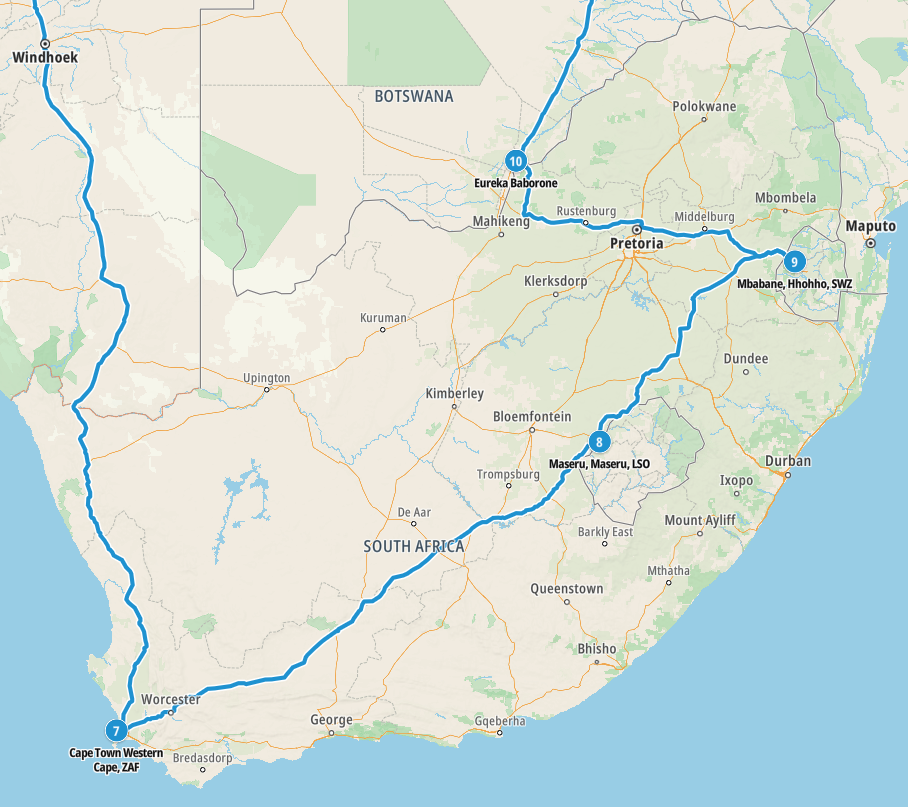
What’s it like to drive in South Africa?
They drive on the left hand side of the road in South Africa. In the main, roads are quite good, however many are unsurfaced dirt tracks. Driving standards are also quite good.
Do you require an international driving permit in South Africa?
We’ve created a dedicated page to driving abroad, which answers this question, and more, which you might find helpful.
Can you use your UK driving license when driving through South Africa?
We’ve created a dedicated page to driving abroad, which answers this question, and more, which you might find helpful.
Do I need a carnet de passages to drive in South Africa?
A Carnet de Passages is required to overland in South Africa. We’ve created a dedicated page to driving abroad, which answers this question, and more, which you might find helpful.
What currency do they use in South Africa?
In South Africa they use the South African rand. Cash is widely used. The use of credit / debit cards is widely accepted. Travellers cheques are readily accepted in cities and tourist areas. There are many ATMs throughout the country.
You should make yourself aware of the amount that your bank charges you for using credit and debit cards abroad. Often credit cards are cheaper for purchasing items directly, and for withdrawing cash from ATMs.
What language do they speak in South Africa?
They mainly speak Zulu and Xhosa in South Africa, although English and Afrikaans are also widely spoken. The other official languages are Ndebele, Northern Sotho, Sotho, Swan, Swazi, Tsonga and Venda.
What time zone is South Africa in?
Remember, when you’re planning your next trip to take a look at what time zone it’s in.
Do I need a visa to visit South Africa?
We’ve created a dedicated, more comprehensive page on visas, which you should find helpful. Check it out!
Is wild camping legal in South Africa?
Yes, wild camping is fine in South Africa.
What plug / socket type do they use in South Africa?
In South Africa they use plug / socket types D, M and N.
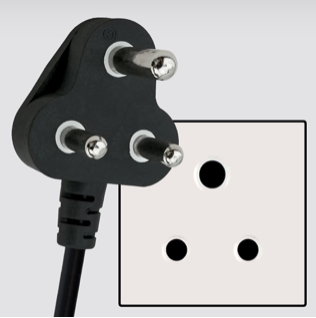
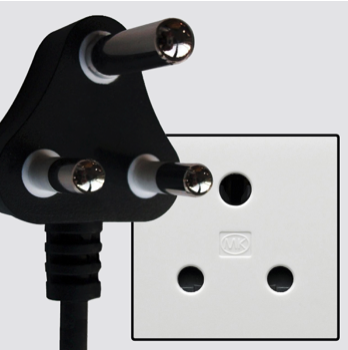
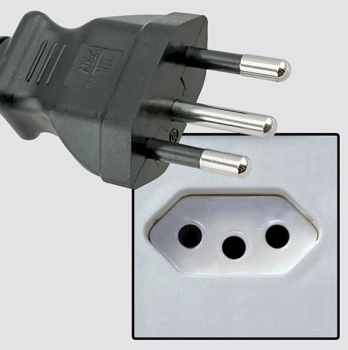
Health issue sin South Africa
Is it safe to drink water in South Africa?
Yes and no, it is safe to drink tap water in cities in South Africa, however it’s not safe in more rural areas. Bottled water is readily available throughout the country.
What vaccinations are required for South Africa?
This NHS website is kept up to date with all relevant information on vaccinations in South Africa.
Phones in South Africa
What is the country calling code for South Africa?
The country calling code for South Africa is +27
What are the emergency phone numbers in South Africa?
- The emergency number for police in South Africa is: 10 111
- In South Africa, the emergency number for ambulance is: 10 177
- The emergency number for fire in South Africa is: 10 177
If you’ve got some useful info that you’d like to share, let us know!
And don’t forget to check out all the other pictures!
